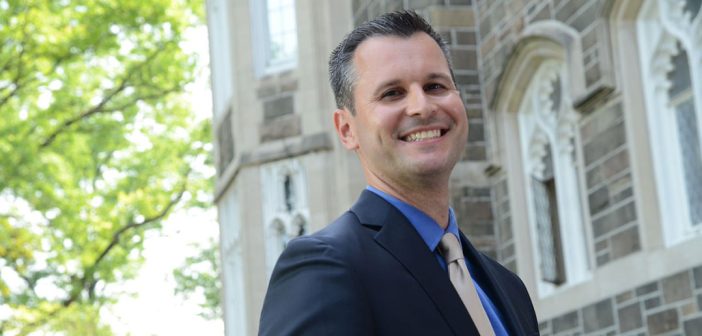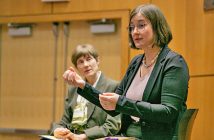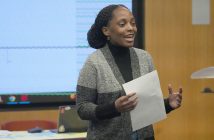In his new role as the inaugural director of Ignatian mission initiatives in the office of the vice president for mission integration and ministry, Parmach’s job is to help others across the University amplify the core principles of Jesuit education in their work.
“My good friend told me, ‘Rob, looking back on it, you always did a lot of, (what she would call) ‘Ignatian side hustles,’” he said with a smile. “All of those side hustles have now joined together to form your new main hustle.”
Parmach, who holds two graduate degrees from Fordham, also added that this reminded him of “what St. Ignatius poignantly shared—‘that which makes you feel the most alive in what you do is where God is.’”
“I’m trying to take theory, mission, and concepts and make [Ignatian spirituality] alive,” said Parmach, who started in his new role last fall. “One of my students said this and I think it’s quite to the point—‘basically, what we’re trying to do as a university is we’re trying to not just know the mission and talk about it, but feel it.’”
His work has been focused in three main areas: mission extension, which includes collaborating with other departments at Fordham; organizing programs, events, and activities such as Ignatian “Learn and Lunch” discussion series, “Mission in Action” food insecurity sandwich-making sessions for local food pantries, and Ignatian flourishing sessions on spirituality; and development/partnerships with groups and organizations outside the University, such as St. Ignatius School in the Bronx, that work with Fordham on community-engaged learning and youth mentoring.
Head, Heart, and Hands
One of the messages Parmach shares is how we should work every day to “instigate our head, our heart, and our hands.”
“I find that this position is a great encapsulation of that,” he said. “I’m involved with a variety of cool initiatives—[helping those]curious about meaningful ideas to connect to different groups of people, all furthering our shared Ignatian mission.”
As for the heart, he said that in this role he’s helping Fordham with “examining our beliefs and what our ethical structure is at the University, our mission—what we really have faith in and believe in.”
“And then your hands, you get out there and roll up your sleeves with other people putting our beliefs to action and fostering reciprocal learning,” he added.
Translating an Ignatian Mindset
One of the ways he’s trying to do that is by hosting events where participants, ranging from undergraduate students to staff members, from graduate students to alumni can learn about Ignatian values and mission and how to put them into practice. Through a partnership with the Career Center, Parmach has organized programs for students to help them “articulate and translate an Ignatian mindset to an employer.”
“We talk about care of the whole person and these Ignatian, Latin terms, but what does that mean to the secular employer? How does that translate on a cover letter, resume, interview skills?” he said.
Faustino Galante, FCRH ’20, a first-year student at Fordham Law School, has attended some of Parmach’s events. He went to one related to work-life balance that helped him learn about the Jesuit practices of self-reflection, which stuck with him.
“I think it’s really great to engage in reflection and contemplation with both alumni and younger students and law students,” he said. “Especially for undergrad students—it’s awesome to get out of the undergrad bubble,” and engage in “very natural” discussions with alumni, staff, and graduate students.
Parmach has also worked with the graduate and professional schools, partnering on a faculty and staff development series with Veronica Szczygiel, Ph.D., interim director of online learning in the Graduate School of Education, and hosting another series with the Graduate School of Arts and Sciences. He’s also worked closely with the Gabelli School of Business and its Responsible Business Leadership Program. This semester, he ran mission-related workshops over two weekends for more than 200 graduate students as a part of their annual business retreat.
Parmach said that many of the students were really grateful to have been introduced to how our Jesuit educational mission applies to their professional and personal interior lives, lessons that they might not have learned elsewhere.
These workshops dove into the issues of ethics and helped attendees gain a deeper understanding of those they will encounter in their professional lives.
“For graduate business students, they want to make sure that they are in fact ethical, responsible business leaders that make a difference, that know people, that understand the different psychologies that make up their future employees, employers, associates,” he said.
Parmach has also partnered quite closely with the Center for Community Engaged Learning, specifically Vanessa Rotondo, who works as the associate director of campus engagement and senior advisor for Ignatian leadership.
“A third of my role is Ignatian student programming,” she said, noting that with Parmach in his new role, “we’re able to really amplify and intensify the kind of work that we’re doing,” she said.
That includes everything from hosting academic conversations on relevant social justice issues that intersect with Ignatian spirituality to public speaking events that help students work on inner struggles, such as fear of speaking to a crowd.
“There are students we work with very closely who are learning these Ignatian ideas with us,” Rotondo said. “And then there are students who might not have any interest in going to an event to hear the didactic story of who St. Ignatius was and how that relates to them.”
To make Ignatian history more appealing to all students, she said, they came up with an idea inspired by the Battle of Pamplona—the infamous battle where St. Ignatius was wounded by a cannonball, inspiring his spiritual journey. They hosted a dodgeball game that attracted more than 120 students.
“It’s things like that, where you’re kind of thinking outside the box and can meet different populations of students where they are, and then kind of infusing the Ignatian identity through that in a way that’s consumable,” she said.
Elevating Diverse Voices
One of the things Parmach is striving to do with the programmatic component is bring diverse and varied voices to the center, particularly those who aren’t often heard from.
“You talk to people who are so committed to this place, but maybe over the years no one has really asked them to speak at the table,” he said. “Maybe their position is not one in which they’re often giving talks, or they’re not teaching in front of a class. So one of my ambitions is to make sure that those people feel like they’re part of the conversation.”
Parmach emphasized the importance of this role in facilitating connections between groups that might not otherwise encounter each other.
“When I’m looking around, when we’re actually doing it and having the event and conversation, there are 25 people that otherwise perhaps wouldn’t know each other,” he said. “There’s a clerical secretary, talking to a law student, who was just talking to a tenured professor, who was speaking to a freshman who just started last week and saw the flier and just wants to meet people.”
An Ignatian Mission Council
Another way he’s facilitating these connections is through a Mission Council, which is a group of about 20 undergraduate and graduate students, staff, faculty, and alumni that meet to discuss ideas for Ignatian programming and events.
Maria Terzulli, an administrator for the Francis and Ann Curran Center for American Catholic Studies, who has participated in the council and many of the other activities, said that she’s grateful for Parmach’s work.
“Rob has taken this new role in bringing the Fordham community together in many different ways—in intellectual ways, in wellness, in helping reach out to the community in tangible ways, gathering people young and old,” she said.
“From my point of view, you follow in Ignatius’s footsteps in doing deeds and works, more than preaching about them.”
Terzulli said that Parmach has done that, serving as an inspiration for her personally by helping her and others put Jesuit values into action.
“He is building community, he is making people aware that there are ways to follow the Ignatian tradition and the mission.”
Continuing Connections
Parmach said students seem to want to participate in events and activities to make connections, more so than before the COVID-19 pandemic.
“A thing that struck me is the real deep desire students have to connect to one another,” he said. “I think in the last couple of years because of COVID and the Zoom world, we’ve been doing a lot of reflection by ourselves but don’t have the opportunity to live that out with other people.”
Parmach hopes to continue to build on this desire to connect with more programs, partnerships, and activities next semester. He wants to expand the Ignatian mission workshops he’s offered to a variety of departments including, academic records, financial services, and admission. He also said he wants to continue to grow his partnership with Carol Gibney, L.M.S.W. in campus ministry, working with graduate students on thier spiritual-life development.
Parmach said he hopes his work is “not seen as an outside force, but rather something that’s central to the way teachers operate in and out of the classroom, the way guidance counselors and mentors work with graduate programs, and how we learn from and treat one another in mission as members of Fordham—so that over time the mission simply and naturally becomes who we are and how we operate as the Jesuit University of New York, nourishing one soul at a time with a shared sense of gratitude and grit.”



